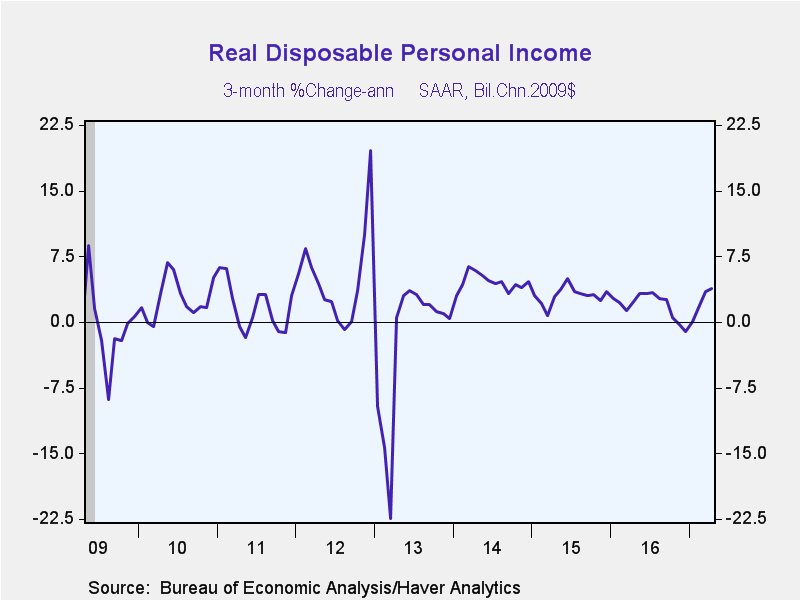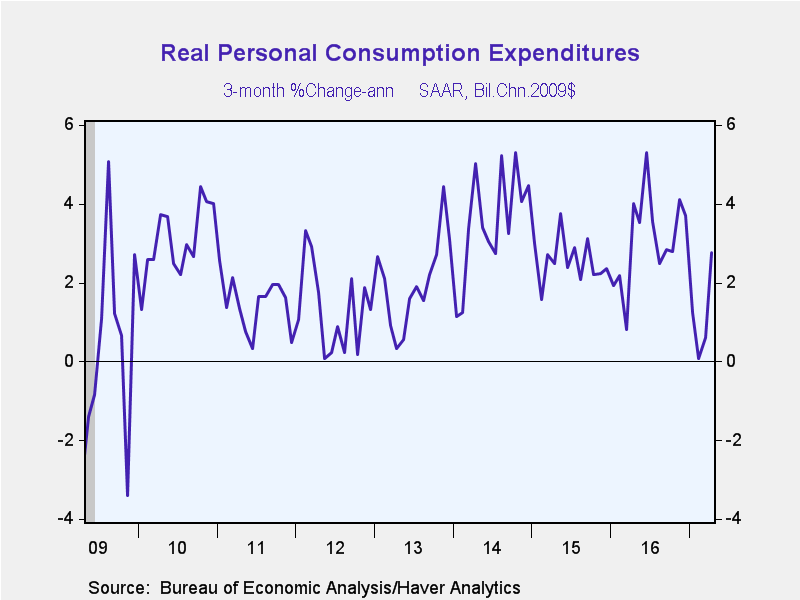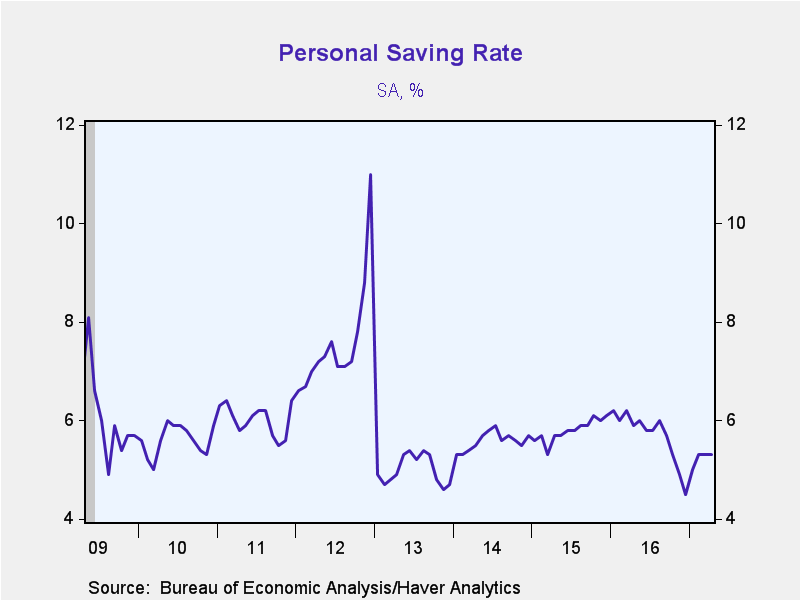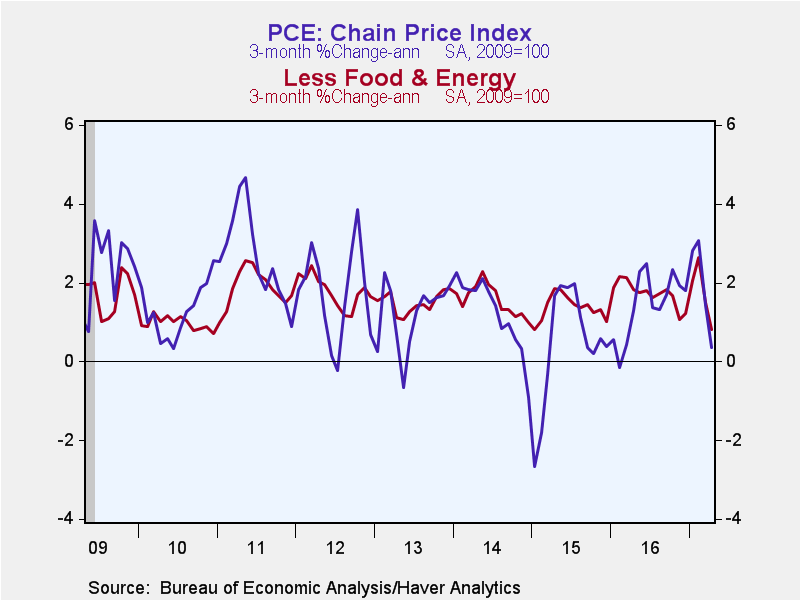 Global| May 30 2017
Global| May 30 2017U.S. Personal Income & Spending Growth Improve
by:Tom Moeller
|in:Economy in Brief
Summary
Personal income increased 0.4% during April following an unrevised March rise. The rise matched expectations in the Action Economics Forecast Survey. Wages & salaries jumped 0.7% (3.7% y/y) after holding steady in March. Rental [...]
Personal income increased 0.4% during April following an unrevised March rise. The rise matched expectations in the Action Economics Forecast Survey. Wages & salaries jumped 0.7% (3.7% y/y) after holding steady in March. Rental incomes posted a 0.9% increase (6.9% y/y), the strongest rise since December. Proprietors' income eased 0.2% (+3.9% y/y), the first decline since December. Transfer receipts held steady (3.6% y/y) as Social Security payments inched 0.1% higher (2.9% y/y). Unemployment insurance payments fell 3.2% (-9.6% y/y). Medicare receipts increased 0.4% (4.4% y/y) and Medicaid payments notched 0.1% higher (5.1% y/y). Personal interest income declined 0.4% (+3.5% y/y) following six straight months of 0.4% gain, and dividend income improved 0.3% (0.7% y/y).
Disposable personal income increased 0.4% (3.7% y/y) following a 0.2% gain. A 0.2% rise in the price index left real disposable earnings up 0.2% (1.9% y/y), the weakest increase in three months.
Personal spending rose an expected 0.4% (4.3% y/y). The strongest rise in four months, it followed a 0.3% gain, revised from no change. When adjusted for higher prices, personal spending increased 0.2% (2.6% y/y) following a 0.5% rise. Real spending on durable goods surged 1.1% (7.0% y/y) after a 0.3% rise. Spending on motor vehicles & parts jumped 1.5% (4.5% y/y) after three consecutive monthly declines. Purchases of home furnishings & appliances gained 0.6% (5.6% y/y) after a 1.1% rise. Buying of recreational goods & vehicles strengthened 1.5% (13.6% y/y) after little change. Nondurable goods purchases improved 0.5% (1.9% y/y) after a 0.4% rise. Gasoline & other energy goods purchases rebounded 3.0% (0.3% y/y) following 1.4% decline. Clothing & footwear purchases improved 0.2% (-0.9% y/y) following a 1.9% jump. Outlays on food & beverages fell 0.3% (+3.3%), down for the third straight month. Real services spending was little changed (2.1% y/y) after a 0.6% increase. Recreation services spending fell 0.5% (+3.2% y/y) following a 1.7% jump, but health care spending rose 0.2% (2.4% y/y). Outlays on housing & utilities fell 0.3% (+0.9% y/y), down for the third month this year.
The personal savings rate held a 5.3% for the third straight month. The March level was revised down from 5.9%. The level of personal saving declined 7.8% y/y.
The PCE chain price index increased 0.2% following a 0.2% decline. The y/y gain eased to 1.7%. The price index excluding food & energy also rose 0.2% after a slight decline. The price index for energy goods & services rebounded 1.0% (10.2% y/y) after two months of decline. The food price index rose 0.2% (-0.6% y/y) following a 0.4% increase.
The personal income & consumption figures are available in Haver's USECON database with detail in the USNA database. The Action Economics figure is in the AS1REPNA database. Further detail is in USNA.
| Personal Income & Outlays (%) | Apr | Mar | Feb | Apr Y/Y | 2016 | 2015 | 2014 |
|---|---|---|---|---|---|---|---|
| Personal Income | 0.4 | 0.2 | 0.5 | 3.6 | 3.4 | 4.4 | 5.2 |
| Wages & Salaries | 0.7 | 0.0 | 0.7 | 3.7 | 3.9 | 5.1 | 5.1 |
| Disposable Personal Income | 0.4 | 0.2 | 0.4 | 3.7 | 3.7 | 3.8 | 5.1 |
| Personal Consumption Expenditures | 0.4 | 0.3 | 0.1 | 4.3 | 3.9 | 3.5 | 4.4 |
| Personal Saving Rate | 5.3 | 5.3 | 5.3 | 5.8 (April '16) |
5.8 | 5.8 | 5.6 |
| PCE Chain Price Index | 0.2 | -0.2 | 0.1 | 1.7 | 1.1 | 0.3 | 1.5 |
| Less Food & Energy | 0.2 | -0.1 | 0.2 | 1.5 | 1.7 | 1.4 | 1.6 |
| Real Disposable Income | 0.2 | 0.4 | 0.3 | 1.9 | 2.6 | 3.5 | 3.5 |
| Real Personal Consumption Expenditures | 0.2 | 0.5 | -0.1 | 2.6 | 2.7 | 3.2 | 2.9 |
Tom Moeller
AuthorMore in Author Profile »Prior to joining Haver Analytics in 2000, Mr. Moeller worked as the Economist at Chancellor Capital Management from 1985 to 1999. There, he developed comprehensive economic forecasts and interpreted economic data for equity and fixed income portfolio managers. Also at Chancellor, Mr. Moeller worked as an equity analyst and was responsible for researching and rating companies in the economically sensitive automobile and housing industries for investment in Chancellor’s equity portfolio. Prior to joining Chancellor, Mr. Moeller was an Economist at Citibank from 1979 to 1984. He also analyzed pricing behavior in the metals industry for the Council on Wage and Price Stability in Washington, D.C. In 1999, Mr. Moeller received the award for most accurate forecast from the Forecasters' Club of New York. From 1990 to 1992 he was President of the New York Association for Business Economists. Mr. Moeller earned an M.B.A. in Finance from Fordham University, where he graduated in 1987. He holds a Bachelor of Arts in Economics from George Washington University.










